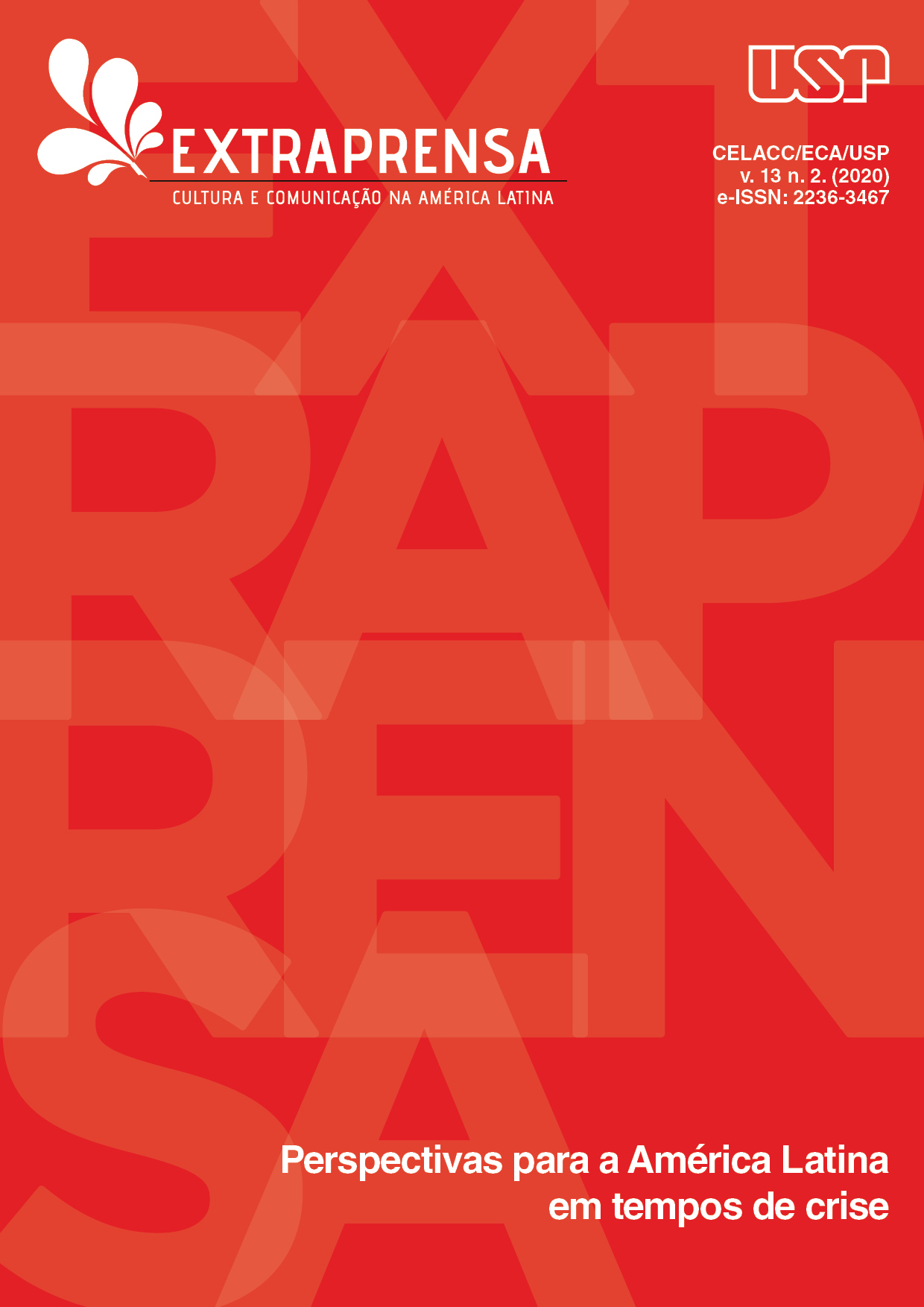Science, Technology, Innovation, Communication and Ethics in the days of Covid-19 in Latin America: interview with Efrain Pantaleón Matamoros and Felipe Chibás Ortiz
DOI:
https://doi.org/10.11606/extraprensa2020.170887Keywords:
Innovation, Communication, Ethics, COVID-19, Latin America, Media and Information LiteracyAbstract
Complex issues such as science communication, use of technology and innovation in an ethical-manner in the struggle against the COVID-19 in the Latin American context are analyzed through the eyes of two scientists, one from social sciences and the other from natural sciences, both Cuban. They analyze the methods used in Cuba, the applications developed by them, the focus of Media and Information Literacy, as well as the future of fighting pandemics in cities in this perspective.
Downloads
References
ATLAN, Henry. Automata Networks Theories in Immunology: their utility and their under determination. Bulletin Mathematical Biology, New York, v. 51, n. 2, p. 247-253, 1989.
BOSTROM, Nick. Superinteligência: caminhos, perigos, estratégias. Rio de Janeiro: DarkSide Books, 2014.
BRASIL. Ministério da Saúde. Conselho Nacional de Saúde. Resolução nº 466, de 12 de dezembro de 2012. Brasília, DF: Presidência da República, 2012.
BUCKERIDGE, Marcos. A abordagem brasileira para enfrentar a covid-19 é baseada em ciência? Ciência na Rua, São Paulo, 20 abr. 2020. Disponível em: https://bit.ly/2zvKhEO. Acesso em: 12 jun. 2020.
CASTELLS, M. The city and the grassroots: a cross-cultural theory of urban social movements. Berkeley: University of California Press, 1983.
CHIBÁS, Felipe Ortiz. MIL Cities metrics for cultural changes and creative jump: metrics and challenges of Sao Paulo. In: UNESCO. World Cities Day. Paris: Unesco, 2019. p. xx-xx.
CHIBÁS, Felipe Ortiz. PANTALEÓN, Efrain Matamoros. ROCHA, Tatiana Andrade. Gestão da Inovação e da criatividade na atualidade. Holos, Mossoró, ano 29, v. 3, p. 15-26, 2013.
CORONAVIRUS en Cuba hasta la fecha: 81 muertes y 1916 contagios. On Cuba News, Havanna, 22 maio 2020. Disponível em: https://bit.ly/2BYSUsd. Acesso em: 25 maio 2020.
ELON MUSK. WIKIPEDIA: the free encyclopedia. [São Francisco: Wikimedia Foundation, 2020]. Disponível em: https://bit.ly/3cVFYjL. Acesso em: 12 jun. 2020.
GRIZZLE, Alton. Assessing citizens’ responses to media and information literacy competencies through an online course: an empirical study and critical comparative analysis of experts’ views. 2019. Dissertação (Doutorado em Filosofia) – Universidade de Barcelona, Barcelona, 2019. Disponível em: https://bit.ly/2UDpYwC. Acesso em: 12 jun. 2020.
HABERMAS, Jürgen. Fios do tempo: precisamos agir como o saber explícito do nosso não saber. Paris: Le Monde, 2020.
IRIBARY, Isac Nikos. Aproximações sobre a transdisciplinaridade: algumas linhas históricas, fundamentos e princípios aplicados ao trabalho de equipe. Psicologia: Reflexão e Crítica, Porto Alegre, v. 16, n. 3, p. 483-490, 2003.
JACK MA. WIKIPEDIA: the free encyclopedia. [São Francisco: Wikimedia Foundation, 2019]. Disponível em: https://bit.ly/30AD2q8. Acesso em: 12 jun. 2020.
KAGERMANN, Henning; WAHLSTER, Wolfgang; HELBIG, Johannes. Securing the future of German manufacturing industry: recommendations for implementing the strategic initiative industrie 4.0: final report of the industrie 4.0 working group. Munich: Herbert Utz, 2013.
KURZWEIL, Ray. A era das máquinas espirituais. São Paulo: Aleph, 2009.
MORIN, Edgar. Introdução ao pensamento complexo. Porto Alegre: Sulina, 2015.
NISSENBAUM, Helen. Privacy as contextual integrity. Washington Law Review, Washington, DC, v. 79, n. 1, p. 119-157, 2004.
PANTALEÓN-MATAMOROS, E et al. Sistema de gestão da monitoração epidemiológica massiva. Revista da Propriedade Industrial, Rio de Janeiro, n. 2.575, p. 16-18, 2020.
TEDROS ADHANOM. In: WIKIPEDIA: the free encyclopedia. [São Francisco: Wikimedia Foundation, 2020]. Disponível em: https://bit.ly/2YrjB0s. Acesso em: 12 jun. 2020.
THOT-CRIARCOM. Temas de pesquisa. Disponível em: em www.crarcom.com. Acesso em: 12 jun. 2020.
UNESCO. Global framework for Media and Information Literacy cities (MIL cities). Paris: Unesco, 2019. Disponível em: https://bit.ly/37rxYFP. Acesso em: 12 jun. 2020.
VALÉRIO, Marcelo; BAZZO, Walter Antonio. Título do Artigo. Revista Iberoamericana de Ciencia, Tecnología, Sociedad e Innovación, Buenos Aires, n. 7, p. xx-xx, 2006.
VARELA, Thais. LVMH produzirá álcool em gel de graça para ajudar combate ao coronavírus. Capricho, São Paulo, 17 mar 2020, 15:52. Disponível em: https://bit.ly/3cTkTGx. Acesso em: 12 jun. 2020.
VERPA, Danilo. Chomsky: não podemos deixar a Covid-19 nos levar ao autoritarismo. Blog da Boitempo, São Paulo, 26 mar. 2020. Disponível em: https://bit.ly/37ntqAq. Acesso em: 12 jun. 2020.
ŽIŽEK, Slavoj. Pandemia: covid-19 e a reinvenção do comunismo. São Paulo: Boitempo, 2020.
Downloads
Published
Issue
Section
License
Ao submeter qualquer material científico para Extraprensa, o autor, doravante criador, aceita licenciar seu trabalho dentro das atribuições do Creative Commons, na qual seu trabalho pode ser acessado e citado por outro autor em um eventual trabalho, porém obriga a manutenção de todos os autores que compõem a obra integral, inclusive aqueles que serviram de base para o primeiro.
Toda obra aqui publicada encontra-se titulada sob as seguintes categorias da Licença Creative Commons (by/nc/nd):
- Atribuição (de todos os autores que compõem a obra);
- Uso não comercial em quaisquer hipóteses;
- Proibição de obras derivadas (o trabalho não poderá ser reescrito por terceiros. Apenas textos originais são considerados);
- Distribuição, exibição e cópia ilimitada por qualquer meio, desde que nenhum custo financeiro seja repassado.
Em nenhuma ocasião a licença de Extraprensa poderá ser revertida para outro padrão, exceto uma nova atualização do sistema Creative Commons (a partir da versão 3.0). Em caso de não concordar com esta política de Direito Autoral, o autor não poderá publicar neste espaço o seu trabalho, sob pena de o mesmo ser removido do conteúdo de Extraprensa.







